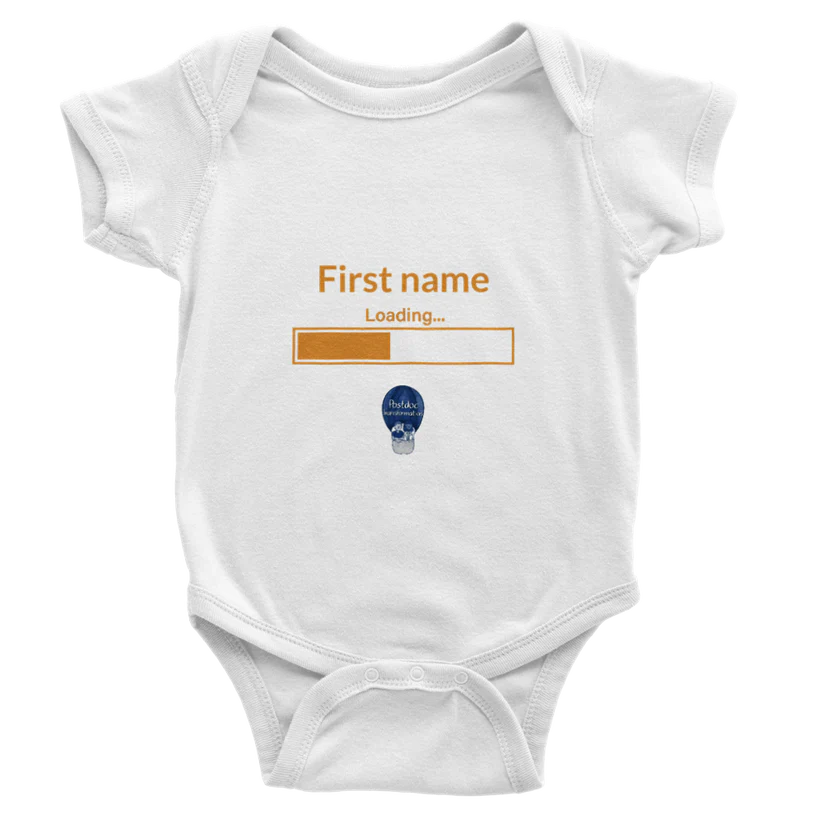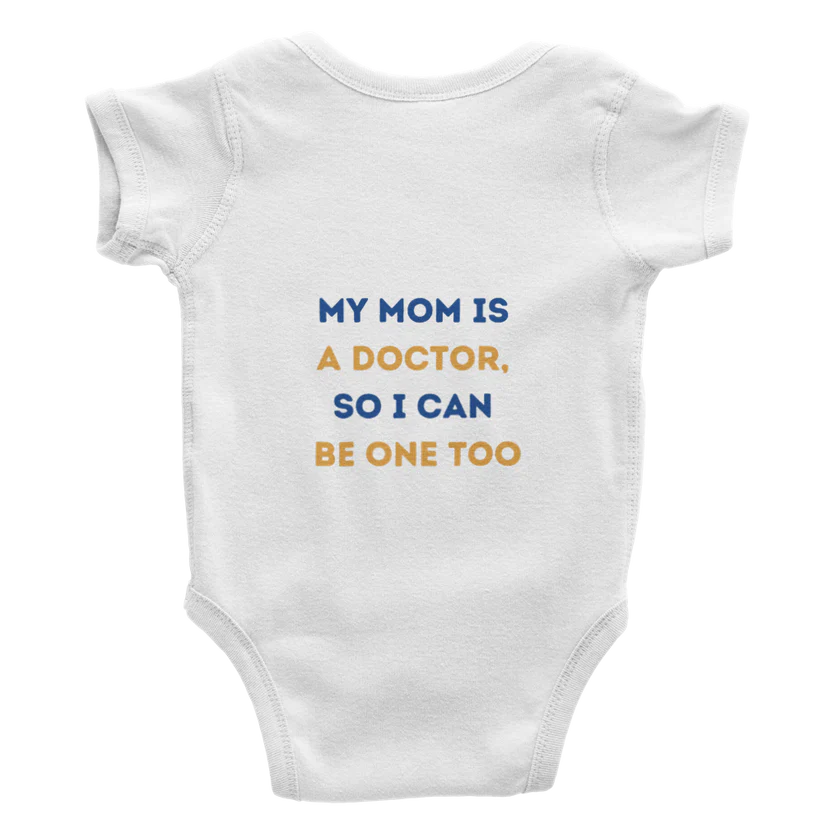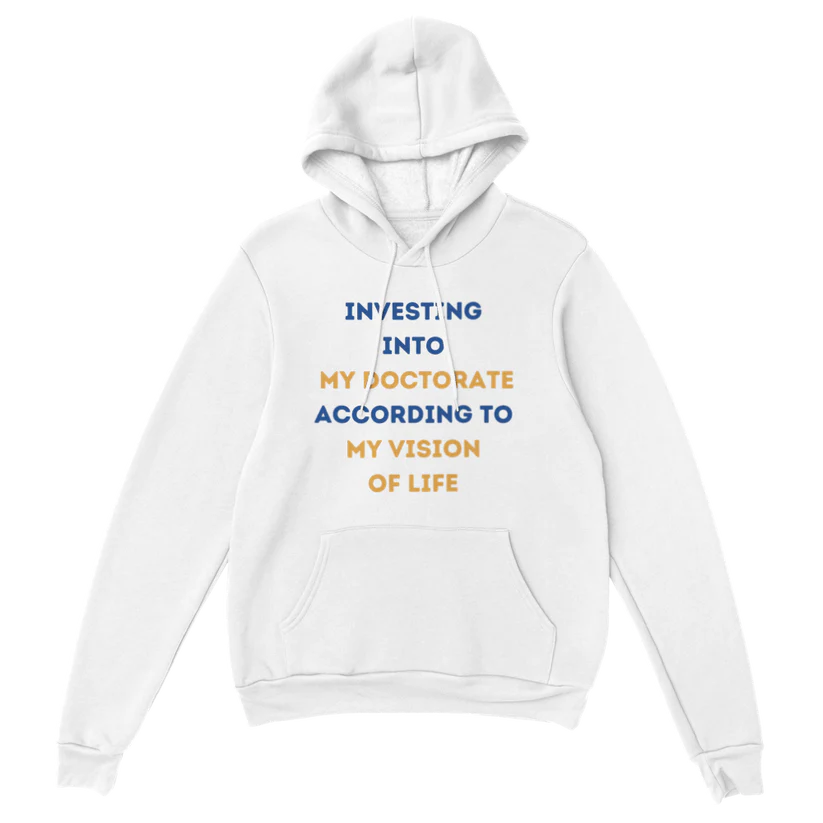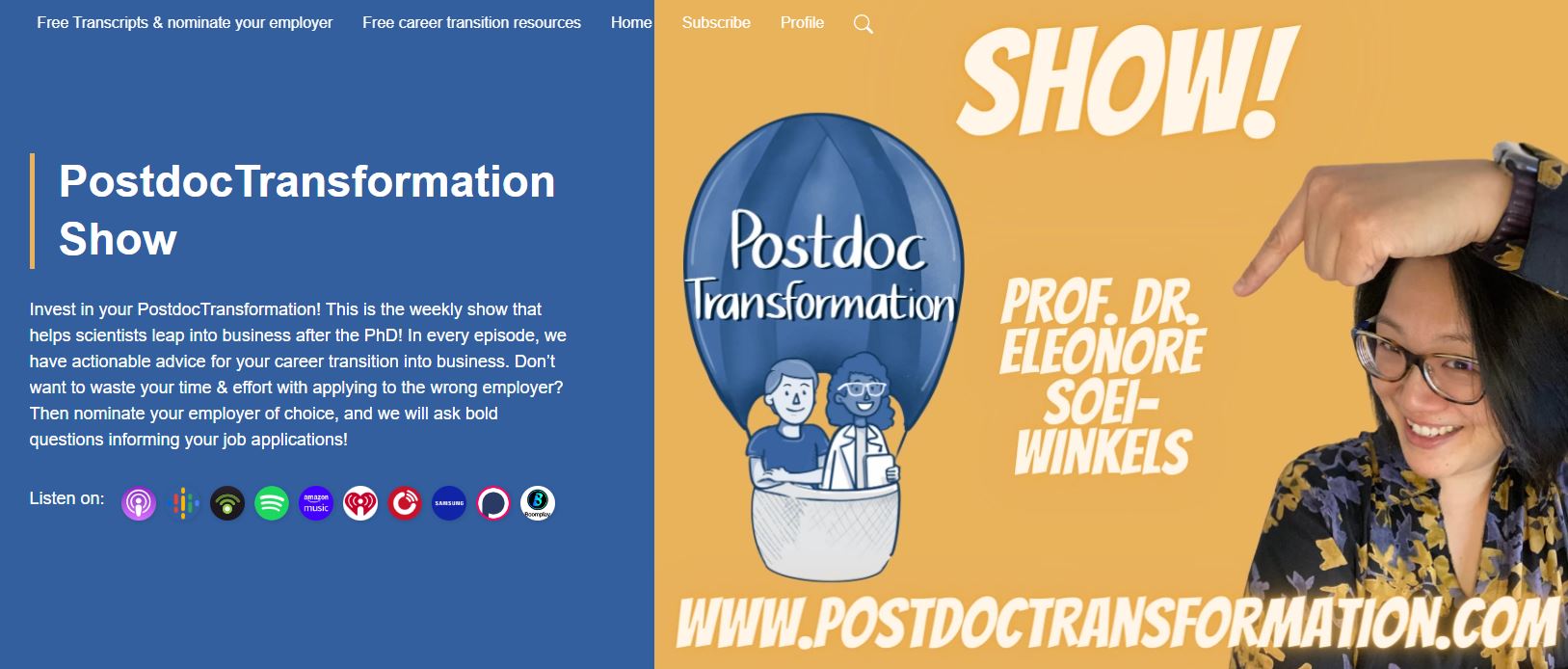
Learn the basics for a career transition from research into business &
get to know companies which hire people with a doctor title!
Episode 0002 Transcript
Let's build your PostdocTransformation with episode 0002:
How I capitalized on my PhD as a mom, professor and business owner
0:00
Have you ever wondered, how you can capitalize on your PhD?
The one you have earned so hardly, you probably had so many opportunity costs in the sense of you “saying no to so many things in your life in your spare time”. Did you have spare time, anyway?
So, you've been working a lot, and probably you weren't paid well as a PhD.
And now the question is, as a postdoc, as an experienced PhD, should you continue in academia, or should you transition your career into business or industries?
I want to share with you some stories of my own because that is something that I seldomly do normally in my e-courses, workshops.
I've been sharing with you how you should do it, and I'm asking you why you should do it.
And also, then we can derive those next steps.
But suddenly I shared so much about myself, because I think that everyone is different. And maybe it's hard for you to discern your transferable skills when you know mine.
Hey, if you are new to the weekly #PostdocTransformation show, and you want to check your readiness to leap out of science first, check out episode 0001.
But still, this is a common question and my direct messages.
So, I put together this episode 0002 together, so that you can understand, how I did it and maybe you are inspired, and encouraged to do something similar, if not the same.
Alright, so without further ado, (in the episode title) there's a professor in the middle. And I put it there on purpose, right, so I love being a professor. But being a mom, becoming a mom was the most profound experience and really a turning point in my life.
Working as a professor is something that I have always wanted, but at the same time working (with responsibilities for the kids), and then in a normal day, it is really hard for a mum, at least for the mom that I want to be.
I was always thinking of how can I run a business in a way that really supports my values, my vision of life as a mom of little ones. Alright, so let's go.
Employment as a first step
First of all, you all probably have a PhD already. Or you're still in the making. So, you are a budding postdoc, so to speak, right?
So, I did my PhD in neuroscience in 2008, I'm 42 years old now. And I did that at the Ruhr-University of Bochum, Research School. They also let their postdocs benefit from all my career counseling services, in person and as e-courses, check them out by clicking on the below picture.
So that's tip number one, if you are a budding postdoc, check out whether at the university you are planning your postdoc experience, whether they also have a graduate school, where you can be associated to get also access to all career counseling services.
After my PhD in neuroscience, I became an IT analyst and it really is because of the research school that I have been able to become an IT analyst. Because through my studies, I was acquainted to two PhD students of different labs, also the neuro computational lab. And they did a lot of coding in their experience.
And that inspired me then to also code my own experiments in the neuropsychology lab. So, I didn't have to do it, but I did it to be independent from the admin who would help us from the IT side.
I had a scholarship of 36 month. I really had need to finish within that timeframe because I didn't want to prolong any more. I just wanted to be finished at that time. And I'll tell you why in a second.
Transferable skills
But essentially that learning experience to code was the ticket into IT industry for me, and right after my graduation day I started as an IT analyst.
IT skills are my transferable skills, and maybe you can also relate to that. I think that PhD students in the STEM fields probably have a strong quantitative background in statistical analysis and that's like data science, data, analytics, big data or machine learning etc.
If you’ve learned one language you probably can learn another language, like MATLAB or Python. So, I learned to code. I still have an affinity of going back to coding, but I'm really not an IT person.
But what I was acquiring also in my PhD, was to be a strategic thinker. Okay, because it was so interdisciplinary, I had to think and see the patterns and to work with different teams.
And I think, if you want to achieve your PhD within 36 months, you have to lead your project. You cannot just wait and see; you have to be the driving force behind that.
And that has led to me, being a project manager, for my own research.
But also, I was able to teach or I was asked to teach and you don't really say no, right? So, I did teach and I did enjoy that, and I still do.
And I think that was the most valuable experience to me so that I was able to develop younger students into that role as a student working on experiments.
So, I'm able to do this in German and also in English, and that was also something really valuable. I wouldn't attribute that to my PhD. But on the other hand, my PhD was also in English, so maybe it's also related to that.
My jobs / roles in IT
So, what were the jobs that I was able to do with my PhD in neuroscience, and I forgot my original background. I'm a psychologist turned neuroscientist turned I analyst and consultant and IT strategy consultant, but was the last role that I had.
I did a lot in IT, like software releases, release management, program management, change management, IT infrastructure. Changes, transformations in mergers and acquisitions. That is when the company says it doesn't want to have a certain part of the company anymore and they sell that part to another company. And then a whole infrastructure, the IT infrastructure, the people the processes that happen everything has to be dissected and the other company has to merge that.
There are the structures and I always supported the people side, knowing and understanding or relating to the people who are working on the architectural IT infrastructure side. That's why I was always person at the interface between the tech and commercial side, the buying side, the whatever the marketing side, the legal side.
If you want to check me out on LinkedIn regarding my professional roles, and my fun content on social media, here we go:
So, I was someone who was really able to lead internally but also externally. While I was happy doing that, I became pregnant. And I always wanted to become a mom. We just didn't fell pregnant right away. So, I was really happy.
And I thought that well, you know, I can try to pursue my career within consulting. But obviously, it's not that easy to be a consultant. And also, I was practically living out of my suitcase from Monday to Thursday and I was only coming home on Friday for the weekend. And then on the weekend, I was already thinking of my next flight to whatever it is.
My future of work
And I thought, well if I am now responsible for this person that is growing in my belly, I don't want to be the mom that is only on the phone and says hello, how are you and so on.
So, I thought that well maybe what are the transferable skills that I have gained until then? And they were different because as a consultant, you are always thinking of how can you support your clients, services, processes, product, how can you improve them to be more future-proof? How can you make them even better?
And that's something that I call intrapreneurial thinking. So, you're not an entrepreneur. It's not your own money. But your client trusts you to come up with ideas so that they can make more money that they can save more money that they can have less risk in investing their money and stuff like that. So, I was always honing my skills on the intrapreneurial side, within a company.
I was job crafting because as a consultant you always try to have your contract extended. The clients decide, whether they want to have you still in the project or whether you should go. I was always trying to work that way, so that they still want me. And that was my job crafting. I was always looking at additional things that I could do to make myself valuable for them.
And for me working in IT was always about leading innovation. So being at the forefront and I think that's also great for scientists like you. Because I think that when you are working in a field where it's exciting like web3 at the moment by NFTs and something like that, it's really important and it does change a lot. So, IT really is something that I think that can ignite you and also relate to your science.
So, I was always leading innovation, just doing IT. It was something where my heart as a psychologist was really deprived.
So, I did pick up teaching psychology modules at the university of applied sciences, where I'm currently working as a professor. Okay, so I dipped my toe back into academia. They liked what I did, and then they said, maybe you want to become a professor at our university, and I said, well you know what, I'm really paid well, you cannot afford me. Whatever you’ll pay me, is probably way less and it's the truth.
And did you know that I offer deep dive courses, workshops and memberships at graduate school, maybe also at yours in the future, as your graduate school coordinator, whether they want to book my services so that I can deliver them to you 24/7 365 on your mobile device.
If your grad school isn't yet our customer, but you need Eleonore to guide you leaping into business asap, this PostdocTransformer Bundle is for you:
Pregnancy
But I said you know what, there's only one reason that I will become a professor. And that is when I'm pregnant. Because when I'm pregnant, it's not about the money. It's more about the time that I can spend at my own terms with my kids. So that was the best decision ever.
I'm so happy that I've become a professor in 2014. Also in 2014, my daughter was born. And I had to reevaluate my career options. And I knew that doing that career that I then wanted in IT consulting was not possible at my terms, but instead I would have to obey.
And I said, no, I'm responsible for this person I'm having in my belly. I don't want to “just obey”. I have a PhD. I'm smart enough. I've put so much work into it to sustain that. And I want to make this more my way and not someone else's way or some other company’s way. And that's why I said I need to realign that with my vision of life.
The concept of having a vision of life is so important, I talked about it question No. 8 in Episode 0001.
Professorship
Then I was appointed as a professor in my pregnancy and I was in the seventh month. When I started with my first lectures, my daughter was nine weeks old.
I designed some onesies I wish I had for my own kids when they were little.
And that was really hard because obviously, she didn't sleep through the night and I breastfed her until she was 13 months old. And all my students then knew that I was a new mum and they put up with me.
This is a perfect gift for the baby shower of every women scientist / business expert or leader or when they leap into maternal leave. We can customize them with your company's / lab's logo and your own text!
And that was really hard because obviously, she didn't sleep through the night and I breastfed her until she was 13 months old. And all my students then knew that I was a new mum and they put up with me.
You know, you're have to do some (milk) pumping in between the lectures. So, my husband or my parents brought my daughter to our place at the university, so that I could give her some milk and then I returned to the lectures; that certainly was really wild. And I really appreciated all my students.
I think that they also had a very seldom and rare opportunity to see a woman professor young enough to have kids to actually have children and to actually breastfeed them at the times when they needed it. That was something that I also shared in another podcast episode on #jobsharingandbeyond, hosted by Karin Tischler.
And it was a tough time. And nowadays, I'm a seasoned professor. I mean 2014-2023, so to speak. We've got two years of COVID Corona services behind us and I've always been a digital professor. So, I think that we managed pretty well.
But at the same time 2014, I wanted to capitalize also on my PhD, as I said that I have much more to offer. You should think about the things that you can bring to the table and sometimes you have more to give and they don't want that or they don't pay for that. They don't appreciate it.
Local career trainings
So, what I did then was to start local career trainings at my graduate school. They asked me to conduct a training to enable and encourage others PhD student to be as thriving in industries like I did in their eyes. And when they asked me, I was like, wow, then I really did feel like a failure, when I left academia.
I did this (career transition) almost secretly. And there were very few people that I trusted with that decision. And it was really hard for me to get the things done in academia, and still be prepared for the next job because, it was December 2008 for graduation day, and in January 2009, I was already starting in business.
And yeah, it was really a tough time for me and that's why I felt so honored to come back to my graduate school. In the sense of being a role model. I put together a training and now have an ecosystem so that we have the e-courses, as the main content.
Once the PhD students have digested that content at their own pace whenever they want across the whole semester on their mobile devices.
And then we can have some workshops where they work on the stuff that they have learned with me and so that was then only a five hour workshop (instead of a two day in person workshop) and that was that was the epiphany moment for me.
Because as I saw that, I am able to teach people that I don't know via my e-course and then we can meet in regular workshops or even memberships across the year so that we make the best out of our time. And I'm so happy that that my graduate school was really so future-proof during the Corona times.
Corona
I think you we all know how it was, so I don't have to reiterate that. I had to care for two kids at the age of two and five at that time, who had to stay at home and one of them was still having his diapers. He was not able to speak.
So, in the first Corona year, we were a team of three at home all day long. My husband had to work outside of the home, and came back at night. I didn't know what my son was thinking because he wasn't able to speak. Caring for my kids and being present for my students at the same time kicked off my urge to reevaluate all my options and also to double down on the business side.
Prevented burnout
Because I had to prevent my own burnout. So, if you are a woman and you're thinking of becoming a mom, or you are already a mom, as a PhD or as a postdoc, or even as a professor, you cannot serve everything equally well as if it was only one task.
Instead, you have to think which you have to prioritize. And this evaluation of your prioritization is something that is regular, that is ongoing. It's not just a decision like this.
And to me honestly, it heavily depends on the youngest kid. And I tried to digitize everything possible in my professorship and also in my business, so that I had a lot of automized processes. And I think that if there's anything that I can do better, let me know, but I think I've got my things all well covered.
Reinvented my business
And then I also rebranded my business because what I didn't want, was to be working at the times when my kids need me.
I wanted to have this geo-arbitrage effect in the sense of I can work at times when others are working but my kids aren't needing me anymore, because it's still nighttime, or it's nighttime almost.
So, my business was locally based and now I'm venturing out to be global. And I can only do this because I have a business model that is heavily depending on my e-courses accessible from everywhere on-demand.
I'm always said to be a serial career transitioner. So, one of my coachees said, “you know, I get it. So, you can change from wherever to wherever, without any problems. But I don't know whether I can do this.”
So, one thing is, it's a routine, okay? I've become an experienced serial career transition as I pivoted from here to here, and every pivot was better than the one before.
Upskilling
If you see me now thriving, it's because I had some failures in the years before.
So, I’ve got probably 15 years more of experience than you. When you're watching me: I'm upskilling constantly. So, the last couple of years, especially in the Corona crisis, I had to learn how to build out our lectures online and not just to record myself reading the slides or whatever.
For my business, I had to build services, the marketing, the selling, the delivery portion, all that is really different in-person and in Germany. Instead, it's completely different now. I think that because I have been career transitioning (multiple times) before, that really does help me that I am confident that I can cope with that.
Maybe my panel with Dr. Irène Kilubi, hosted by Karin Tischler for her #JobsharingAndBeyond #ItsPossible series within Canada's career month is also helpful for you:
Vision of life
Everything that I do is aligned with my own vision of life. It is in short, how do you want to live your life after your PhD?
Remember to invest into your doctorate according to your vision of life!
Not just a couple of years after that, not just next week after the PhD, but more like in your 50s, 60s or 70s? What will you have achieved because you have done your PhD?
I mean, your life as a 60-year-old person, as a 70-year-old, should differ from the life of someone who didn't do a PhD, right? You should have the quality of life that you deserve.
And that's why it's so important that you have a vision of life. That's like a north star that you can you can look up to and say, is this really valuable? And also, is this goal directed or not?
So, for me, it's I want to spend my time less 1:1.
I want to have more automated processes in my services. I want more classroom that is flipped and not traditional.
Okay, so you have to know, what you want. And then everything else will fall into place.
Hey, have you found this episode so far helpful for yourself? Well, maybe you can subscribe and also share this episode with your PhD bestie. Because that would encourage us to help the underprivileged, underrepresented and underserved early career scientists leaping into business. And now back to the show.
And once you have determined your readiness to leap and you think yes, this is the way forward I want to transition into business or industries, then you can enroll in your free email course with 10 actionable bingeable email lessons until you start your job in business.
Thanks for listening,
Eleonore and Team PostdocTransformation!
P. S. Hey, do you have a questions related to this episode? Record it on our SpeakPipe and Eleonore will answer in a future episode! Or just share your Aha moment, as we want to build a community, not a one-way venue, LOL. Letting us know, what resonates with you, will make our day!
PostdocTransformation Show mug (buy 1 or get 3 for FREE)
Yeah, you are a grateful listener of our PostdocTransformer Show!
Do you want to support us in our mission to support underserved, underrepresented and underprivileged early career scientists in leaping into business?
Well, then get 3 mugs for free (we cover the costs and shipping), and you place them at your grad school and/or lab kitchen for your PhD peers. Just enter "3mugs" and "freeshipping" and you'll get a 100% discount. Thank you for investing your time into our PostdocTransformation!
Want to check me out in German on the topic of people development as a professor?
Wenn ihr wissen wollt, wie sich Passion im Wissenschaftsumfeld anfühlt, dann hört rein: Barbara Liebermeister spricht mit Prof. Dr. Eleonore Soei-Winkels. Sie hat einen PhD in Neuroscience, ist aktiv als Professorin für Wirtschaftspsychologie an der FOM Hochschule für Oekonomie und Management, hat ein eigenes Unternehmen PostdocTransformation und formt nach eigener Aussage Helden und Heldinnen! Die unkonventionelle Professorin produziert Podcasts und ist aktiv in den sozialen Plattformen unterwegs - auch um sich für die Inklusion von Benachteiligten einzusetzen.
Working Mom | Changemakerin | Phd. in Neurowissenschaften –
Lehrauftrag an der FOM Hochschule für Ökonomie und Management in Düsseldorf und Gründerin ihrer eigenen online Lernplattform allyoucanlearnbuffet – dafür nutzt sie von Instagram Reels über YouTube zu LinkedIN alles was Social Media für gehirngerechtes Lernen zu bieten hat. Wir reden darüber wie Lernen sich verändert. Und wir spannen den Bogen zu weiblichen Fähigkeiten und deren Bedeutung in neuen Lern- und Lebensrealitäten. Schnallt Euch an, denn es wird eine rasantes Gespräch, dass Eure Synapsen durcheinanderwirbeln wird und voller Insights aus Wissenschaft, Organisationspsychologie und Persönlichem steckt.
















